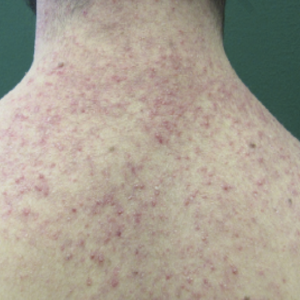A case of chronic granulomatous disease and acne: is isotretinoin a safe treatment?

HTML: 23
All claims expressed in this article are solely those of the authors and do not necessarily represent those of their affiliated organizations, or those of the publisher, the editors and the reviewers. Any product that may be evaluated in this article or claim that may be made by its manufacturer is not guaranteed or endorsed by the publisher.
We report the case of a patient with chronic granulomatous disease and acne treated with isotretinoin, who developed a diffuse staphylococcal skin infection during the therapy. Chronic granulomatous disease is a rare genetic disorder characterized by an altered innate immunity with an increased risk of potentially lethal bacterial and fungal infections. Although chronic granulomatous disease is rare, acne is a common manifestation in these patients, but there are no data about the gold standard therapy.
Henrickson SE, Jongco AM, Thomsen KF, et al. Noninfectious Manifestations and Complications of Chronic Granulomatous Disease. J Pediatric Infect Dis Soc. 2018;7(suppl_1):S18-S24. DOI: https://doi.org/10.1093/jpids/piy014
Magnani A, Brosselin P, Beauté J, et al. Inflammatory manifestations in a single-center cohort of patients with chronic granulomatous disease. J Allergy Clin Immunol. 2014;134(3):655-662.e8. DOI: https://doi.org/10.1016/j.jaci.2014.04.014
King K, Jones DH, Daltrey DC, Cunliffe WJ. A double-blind study of the effects of 13-cis-retinoic acid on acne, sebum excretion rate and microbial population. Br J Dermatol. 1982;107(5):583-590. DOI: https://doi.org/10.1111/j.1365-2133.1982.tb00410.x
Leyden JJ, McGinley KJ, Foglia AN. Qualitative and quantitative changes in cutaneous bacteria associated with systemic isotretinoin therapy for acne conglobata. J Invest Dermatol. 1986;86(4):390-393. DOI: https://doi.org/10.1111/1523-1747.ep12285658
Leyden JJ, James WD. Staphylococcus aureus infection as a complication of isotretinoin therapy. Arch Dermatol. 1987;123(5):606-608. DOI: https://doi.org/10.1001/archderm.123.5.606
Alonso-de-Celada RM, de-Lucas Laguna R. Safe and successful treatment of acne vulgaris with isotretinoin in a patient with chronic granulomatous disease. Pediatr Dermatol. 2012;29(5):662-663. DOI: https://doi.org/10.1111/j.1525-1470.2011.01510.x
Barbi E, Berti I, Minute M, Zennaro F. Successful treatment of acne with isotretinoin in chronic granulomatous disease. Eur J Dermatol. 2011;21(1):111-112. DOI: https://doi.org/10.1684/ejd.2010.1171
Spillane AP, Hivnor CM. Isotretinoin use in a case of chronic granulomatous disease. Pediatr Dermatol. 2009;26(6):756-758. DOI: https://doi.org/10.1111/j.1525-1470.2009.01031.x
Kemp A, Rogers M, Kamath R. Retinoid-associated hypertriglyceridemia in chronic granulomatous disease. Am J Med. 1989;86(3):360-361. DOI: https://doi.org/10.1016/0002-9343(89)90319-7
von Bernuth H, Wahn V. Systemic treatment with isotretinoin suppresses itraconazole blood level in chronic granulomatous disease. Pediatr Allergy Immunol. 2014;25(4):405-407. DOI: https://doi.org/10.1111/pai.12181
Stevison F, Kosaka M, Kenny JR, et al. Does In Vitro Cytochrome P450 Downregulation Translate to In Vivo Drug-Drug Interactions? Preclinical and Clinical Studies With 13-cis-Retinoic Acid. Clin Transl Sci. 2019;12(4):350-360 DOI: https://doi.org/10.1111/cts.12616
Copyright (c) 2022 the Author(s)

This work is licensed under a Creative Commons Attribution-NonCommercial 4.0 International License.
PAGEPress has chosen to apply the Creative Commons Attribution NonCommercial 4.0 International License (CC BY-NC 4.0) to all manuscripts to be published.





 https://doi.org/10.4081/dr.2023.9631
https://doi.org/10.4081/dr.2023.9631



